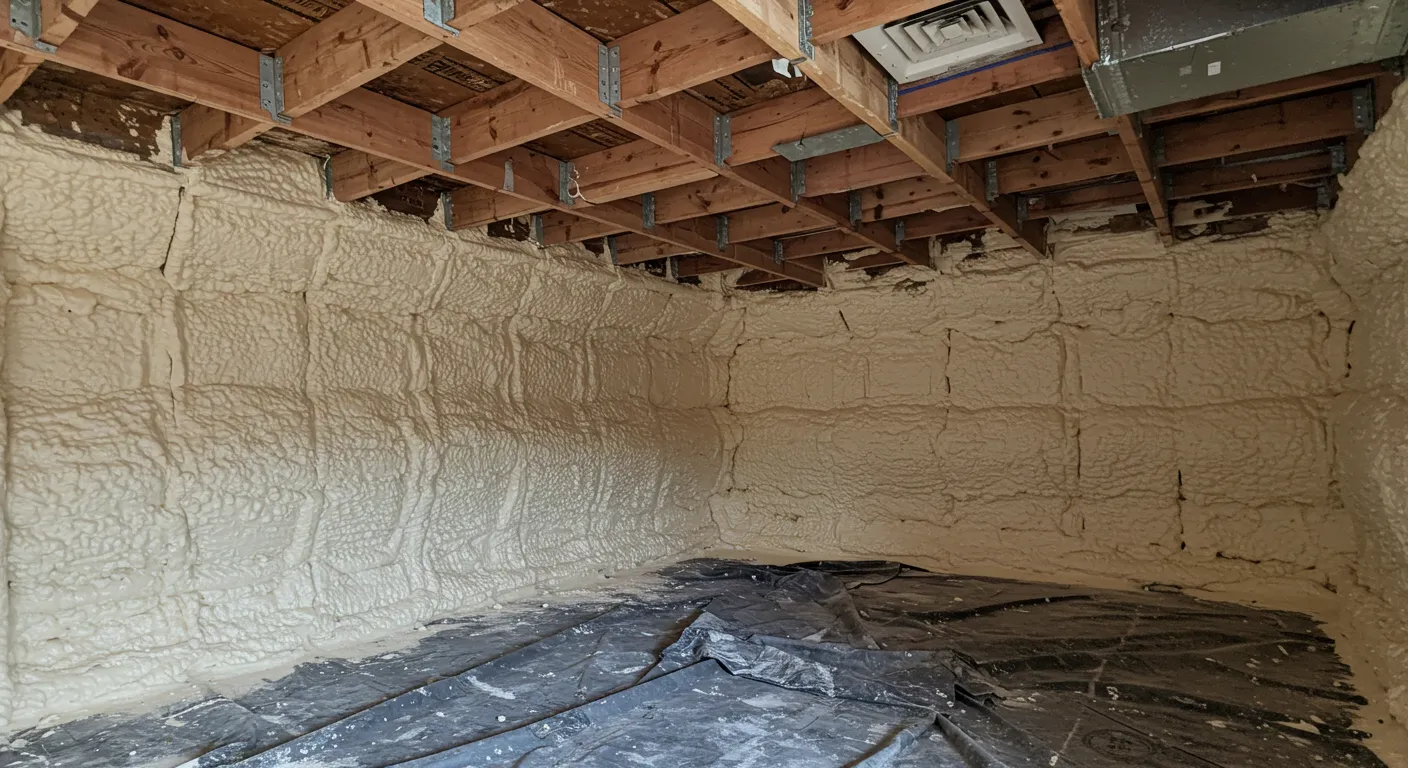Looking to reduce energy bills and improve home comfort in Raleigh? Spray foam insulation may be the smart upgrade your home needs. At Raleigh Excel Spray Foam Insulation, we’ve seen firsthand how the right insulation transforms a property’s energy efficiency, slashes utility costs, and adds long-term value especially in North Carolina’s climate.
Yes, spray foam insulation is worth the investment in Raleigh, NC. It offers superior thermal performance, creates an air-tight seal that helps keep your home cooler in summer and warmer in winter, and significantly reduces energy loss. While the upfront cost is higher than traditional insulation types, the return on investment (ROI) through energy savings, moisture control, and increased property value makes it a cost-effective choice over time.
This guide dives into the benefits, costs, comparisons, and things to consider before upgrading, so you can make a confident, well-informed decision for your home.
Why Spray Foam Outperforms Traditional Insulation
The Basics of Spray Foam
Spray foam insulation expands on contact to fill gaps and cracks, forming an airtight, moisture-resistant barrier. It comes in two main types:
- Open-cell foam: Lighter and more flexible; great for interior walls and soundproofing.
- Closed-cell foam: Denser and more rigid; offers higher R-value and moisture resistance, ideal for attics, crawl spaces, and basements.
Spray Foam vs. Other Insulation Types
| Feature | Spray Foam | Fiberglass | Cellulose |
|---|---|---|---|
| R-Value (per inch) | 3.5–6.5 (Closed Cell) | 2.2–2.7 | 3.2–3.8 |
| Air Seal | Excellent | Poor | Moderate |
| Moisture Resistance | High | Low | Moderate |
| Mold Resistance | Yes | No | Variable |
| Lifespan | 30+ years | 10–25 years | 20–30 years |
| Cost | $$$ | $ | $$ |
Bonus Tip: If your attic or crawl space suffers from humidity, closed-cell foam is a smart investment for its vapor barrier properties.
Understanding ROI: Energy Savings in Raleigh Homes
According to Energy Star, proper insulation and air sealing can save homeowners 15–20% on heating and cooling costs annually. In Raleigh’s humid subtropical climate, these savings add up quickly.
Sample ROI Estimate:
| Home Area | Annual Energy Savings | Spray Foam Cost (Est.) | Payback Period |
|---|---|---|---|
| 1,500 sq ft attic | $350–$500 | $2,500–$3,500 | 6–8 years |
| Crawl space (1,000 sq ft) | $200–$350 | $1,500–$2,000 | 5–7 years |
Note: These are average estimates. Actual savings vary based on home condition, HVAC efficiency, and insulation thickness.
Things to Know Before Insulating Your Home
1. Assess Your Home’s Current Efficiency
Before installing spray foam, evaluate:
- Air leakage around windows, doors, and attic hatches
- Existing insulation condition
- HVAC system performance
Bonus Tip: Schedule a home energy audit to pinpoint exact problem areas. Many utilities in NC offer rebates or low-cost assessments.
2. Check for Rebates or Incentives
Local and federal programs often provide:
- Energy rebates (up to $1,200 for insulation upgrades)
- Tax credits for energy-efficient improvements
- Duke Energy Smart Saver incentives
3. Proper Ventilation Matters
Air-tight insulation changes how your home “breathes.” Ensure:
- Adequate attic ventilation remains intact
- Bathroom/kitchen exhaust fans vent outside
- Crawl spaces are either sealed or properly ventilated
Technical Specs & Definitions
| Term | Description |
|---|---|
| R-Value | Measures insulation’s resistance to heat flow |
| Open-cell foam | Lower R-value, sound-absorbing, vapor permeable |
| Closed-cell foam | High R-value, moisture barrier, structural support |
| Thermal bridging | Heat transfer across poorly insulated framing |
| Air sealing | Process of eliminating drafts and leaks |
- Is spray foam too expensive?
While it costs more upfront, Raleigh homeowners report major long-term savings—especially in older homes with poor insulation.
- Will it make my home too tight?
Not if installed properly. Professional installers like us ensure proper ventilation strategies are in place.
- Is it safe?
Once cured, spray foam is inert and non-toxic. Ensure certified installers are used to avoid off-gassing issues during application.
Ready to Achieve Energy Efficiency and Long-Term Savings?
Investing in spray foam insulation with Raleigh Excel Spray Foam Insulation means choosing durability, comfort, and real energy savings tailored to the needs of Raleigh homes.
Apply these insights now: Schedule your insulation quote with Raleigh Excel Spray Foam Insulation and discover the difference quality insulation makes.
Contact Us: (919) 301-9435 or [email protected]
Your Insulation Questions Answered by Raleigh Excel Spray Foam Insulation
How long does spray foam insulation last?
Spray foam can last over 30 years with little to no degradation, outperforming most traditional materials.
Will spray foam reduce my energy bills immediately?
Yes most homeowners notice improvements within the first billing cycle, especially during peak heating/cooling months.
Can I install spray foam myself?
DIY kits exist but are risky. Professional installation ensures even coverage, code compliance, and safer chemical handling.
Is spray foam insulation environmentally friendly?
Yes, it reduces energy consumption, and many formulas are now low-VOC and use environmentally responsible blowing agents.
Where is spray foam most effective in the home?
Attics, crawl spaces, rim joists, and exterior walls offer the most dramatic improvements when sealed with spray foam.




